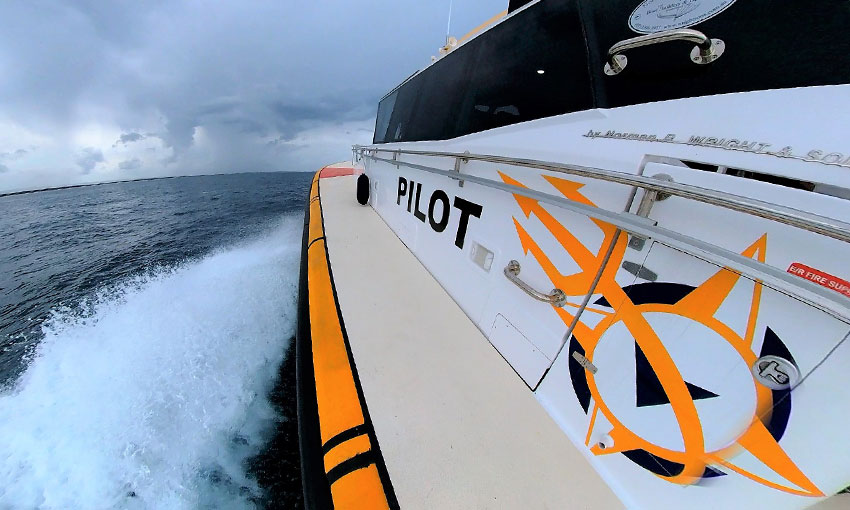POSEIDON Sea Pilots began operations at the Brisbane pilotage area on New Years Day, when its 10-year contract to pilot ships in Moreton Bay came into effect.
The day marked the end of operations in the area for Brisbane Marine Pilots, which had been providing pilotage services in the pilotage area for more than 30 years.
PSP general manager Captain Robert Buck said taking over pilotage services for the Brisbane pilotage area all had gone smoothly, apart from the south-east Queensland weather.
“On January 1 we piloted the first of the 2500 vessels expected to dock in Brisbane in 2022,” Mr Buck said.
“Thanks to an experienced team, all has gone to plan, although Mother Nature has been unkind this week with 30 to 40 knot winds being generated by ex tropical cyclone Seth sits off South East Queensland this week. We may be experiencing some rather large seas and high winds, but the transition to the primary piloting role has been smooth sailing.”
Several industry organisations, including the Australian Maritime Officers Union and AMPI, raised concerns about the level and kind of training PSP pilots were undertaking before taking over as the sole provider of pilotage services in the area.
The arguments centred around a lack of on-water training, as PSP pilots did not have opportunities for any on-water experience before 1 January and no pilots from Brisbane Marine Pilots took up roles with PSP. And, the argument goes, this lack of on-water experience could be a contravention of IMO Resolution A.960 (Annex 1, section 5.2), which says training should include “practical experience gained on vessels under actual piloting conditions”, supplemented by simulators.
Brisbane Marine Pilots applied to the Queensland Civil and Administrative Tribunal (QCAT) for a review of pilot licenses issued by Maritime Safety Queensland to employees of Poseidon Sea Pilots. The matter was heard on 15 December, and QCAT handed down its decision to dismiss the application on 23 December.
MSQ acting general manager Jim Huggett told DCN the decision vindicated the transition and licencing process applied by MSQ.
“MSQ absolutely refutes both Australian Marine Pilots Institute (AMPI) and Australian Maritime Officers Union’s alarmist assertions we have changed the rules, or our training arrangements do not comply with IMO Res A960,” he said.
“The licencing of PSP’s pilots was the culmination of almost two years of work by MSQ and PSP to provide a new pilotage service, a process supervised by some of the most experienced marine pilots in Australia.”
Mr Huggett said MSQ employs a rigorous and comprehensive approach to pilot licensing, which includes experience, knowledge, simulation, examinations, references and independent check pilots.
“MSQ has invested in a robust process of stakeholder engagement including understanding key positions held by stakeholders, such as pilotage service providers, industry peak bodies, user groups, unions and other maritime associations,” he said.
“MSQ has successfully used simulation assessment to assist in pilot licensing in various Queensland ports.”
Mr Huggett said PSP’s pilots are experienced pilots with high-level licences based on their extensive on-water experience, trained in a traditional on-water manner and undertaken local familiarisation activities (including on-water familiarisation) for the Port of Brisbane.
“Safety of ship movements in all Queensland ports, including Brisbane, is paramount and MSQ works with, monitors and audits the performance of all pilotage service providers,” Mr Huggett said.
“MSQ also notes many stakeholders Australia-wide, including the Port of Brisbane, are supportive for the transition process underway in Brisbane.
“MSQ would like to acknowledge and thank Brisbane Marine Pilots for the delivery of pilotage services in the port of Brisbane for the previous three decades.”
Mr Buck echoed Mr Huggett’s sentiments, saying all Poseidon pilots had completed extensive local on-water and in-simulator training to ensure, and like their airline counterparts, they are familiar with every scenario in local waters, from an emergency to a safe crossing.
“We have a very experienced team, but we have enhanced the service by introducing new safety technologies that have never been used by pilots in Moreton Bay before. This brings pilotage in the Port of Brisbane into line with the rest of the world,” Mr Buck said.
PSP has introduced a pilot training program that it said would improve pilotage employment opportunities, improve succession management, and welcome different cultures, ages, and genders to the bridges of Queensland.
“In the past, Brisbane has been considered by many marine pilots globally as a closed shop. It was impossible to break in because in the past because many of the Brisbane pilots owned a share of the company that had the tender. Their vested interest didn’t nurture fresh and different skills and ideas and it did nothing for diversity,” Mr Buck said.
“At Poseidon, pilots are awarded tenure based on performance, not ownership of the business, and we’re excited to welcome the first female pilot to Moreton Bay.”
Captain Buck said Poseidon Sea Pilots was committed and looking forward to providing first class pilotage services in the port of Brisbane.
“This is a marathon, not a sprint. The next 10 years will mark the start of an enduring relationship with the port of Brisbane and key stakeholders,” he said.





